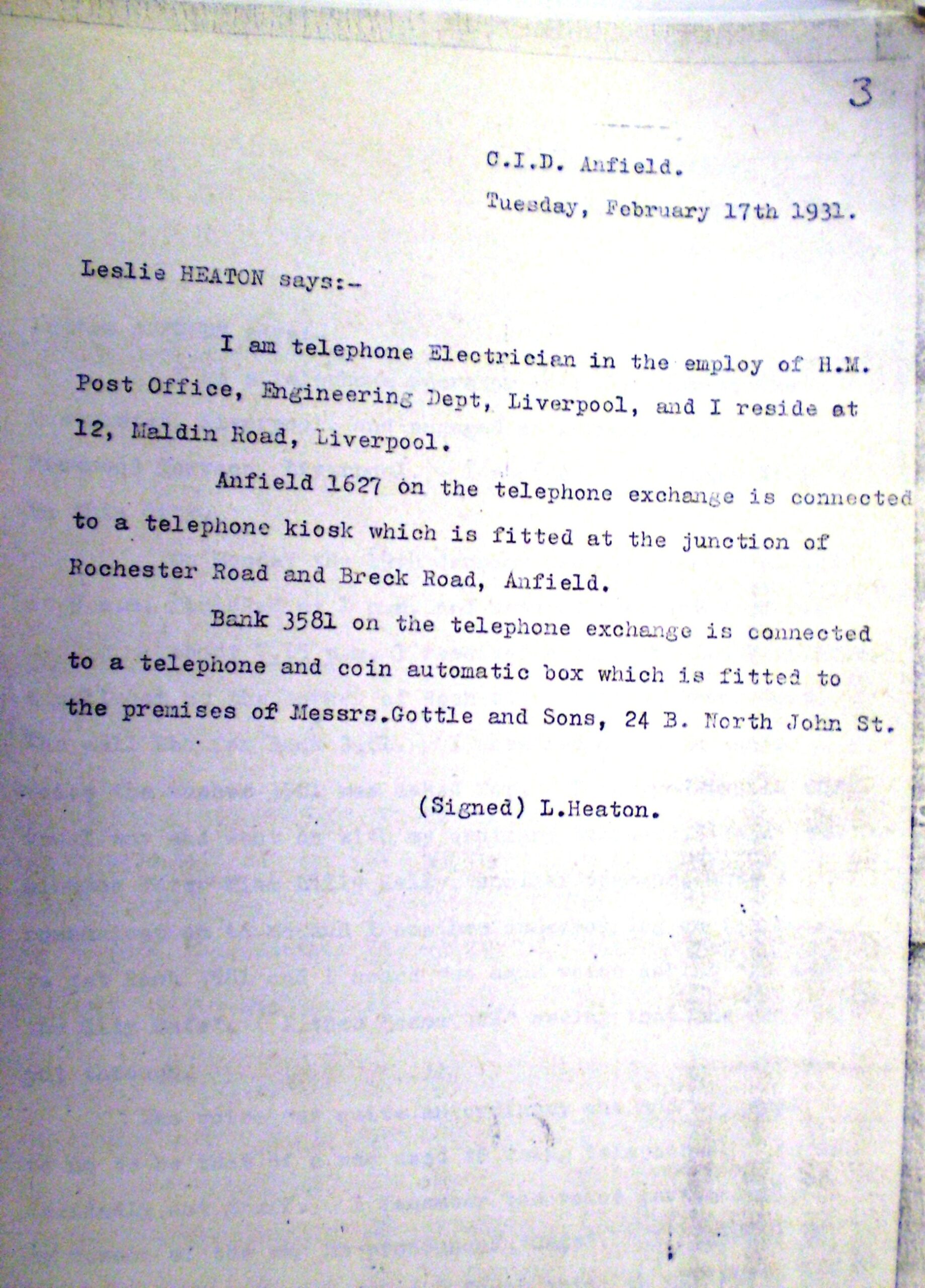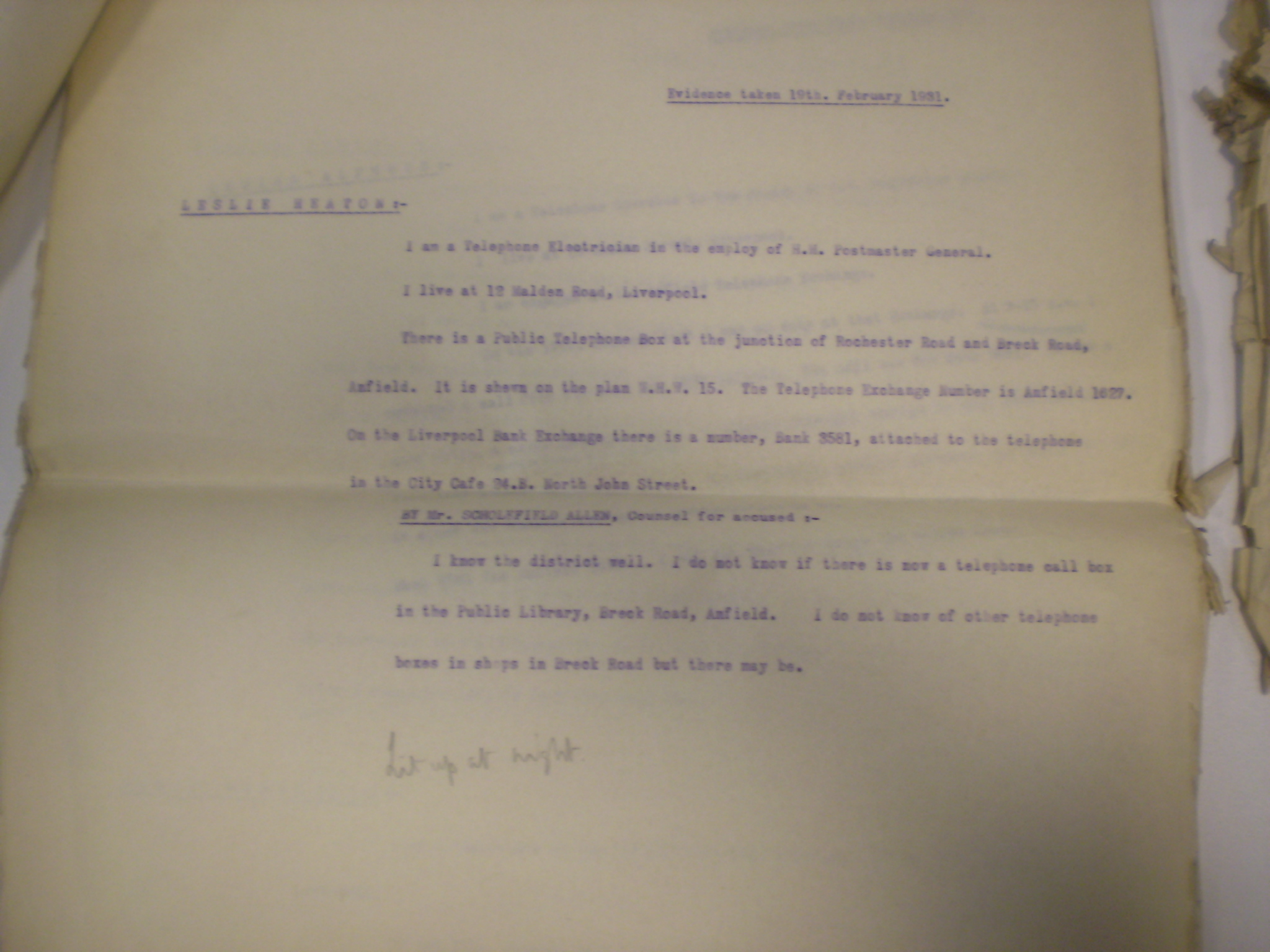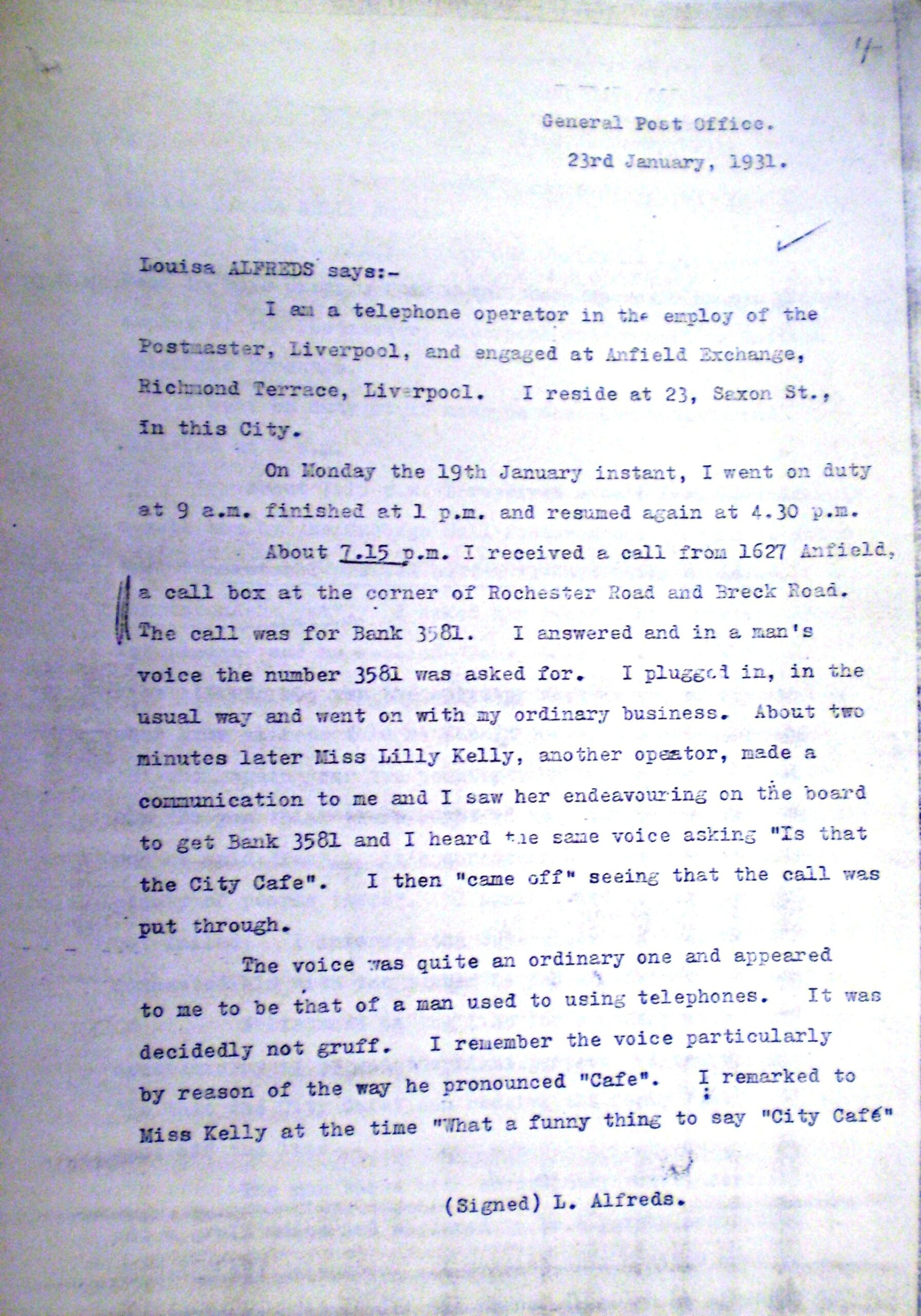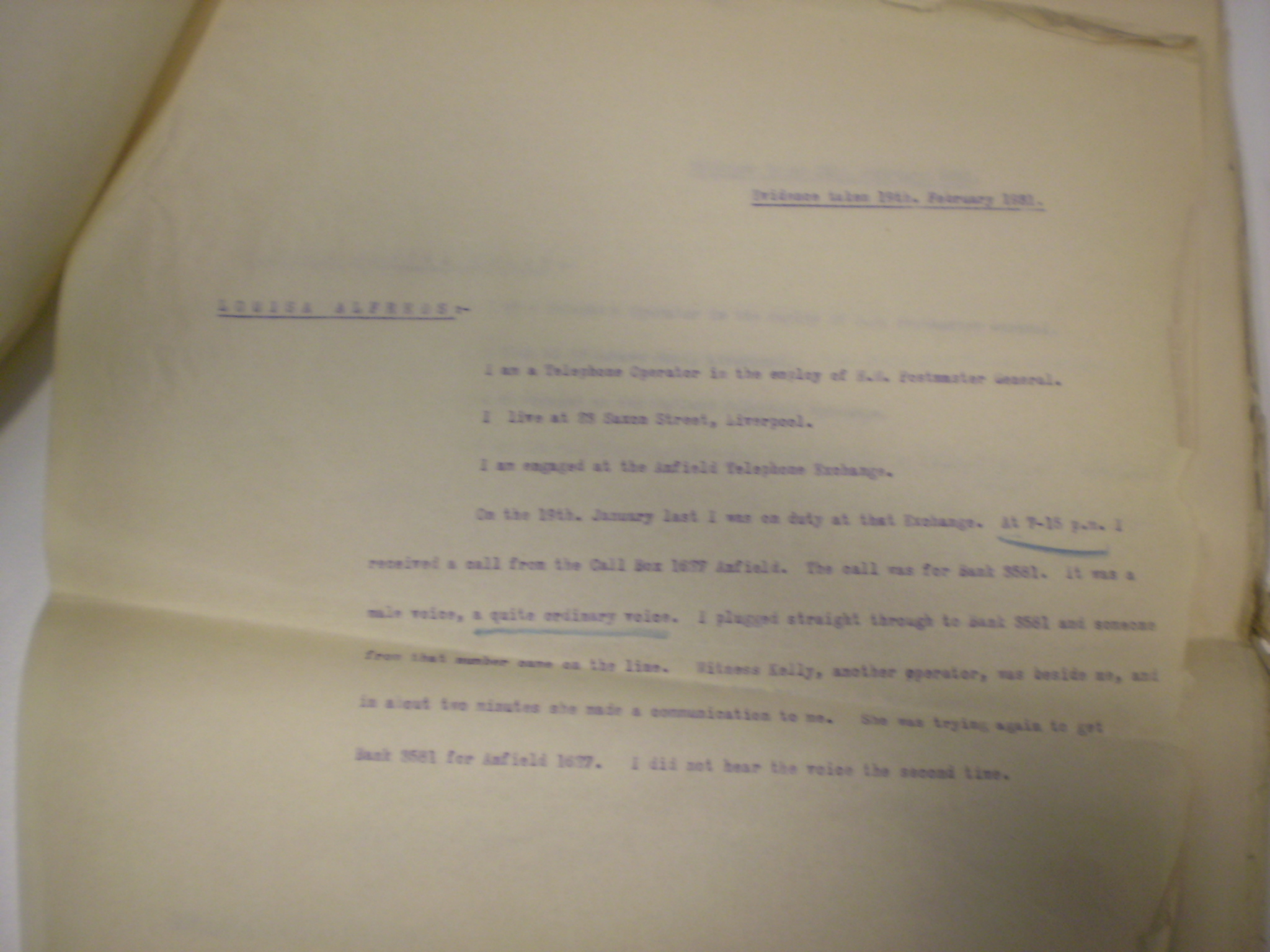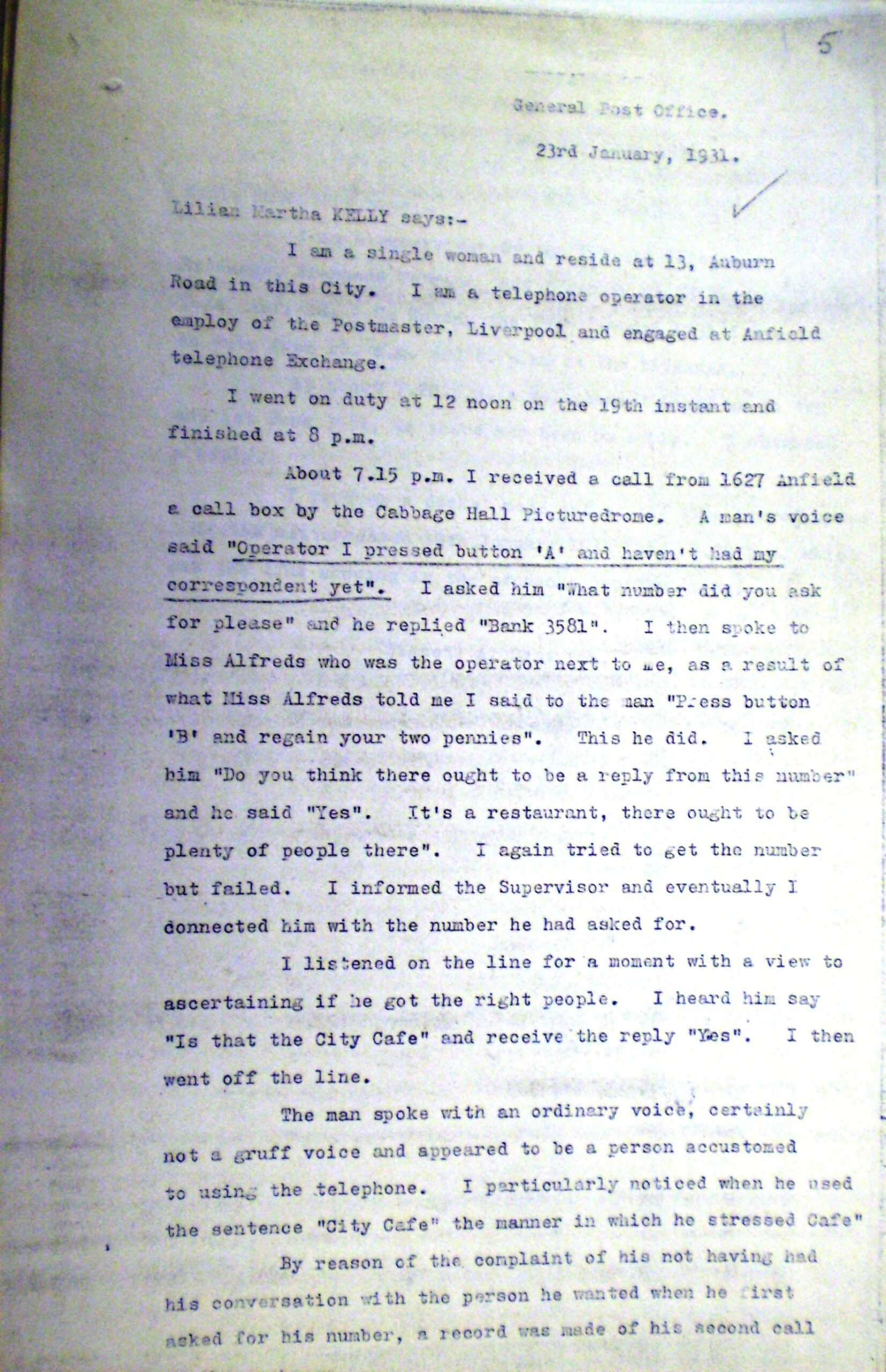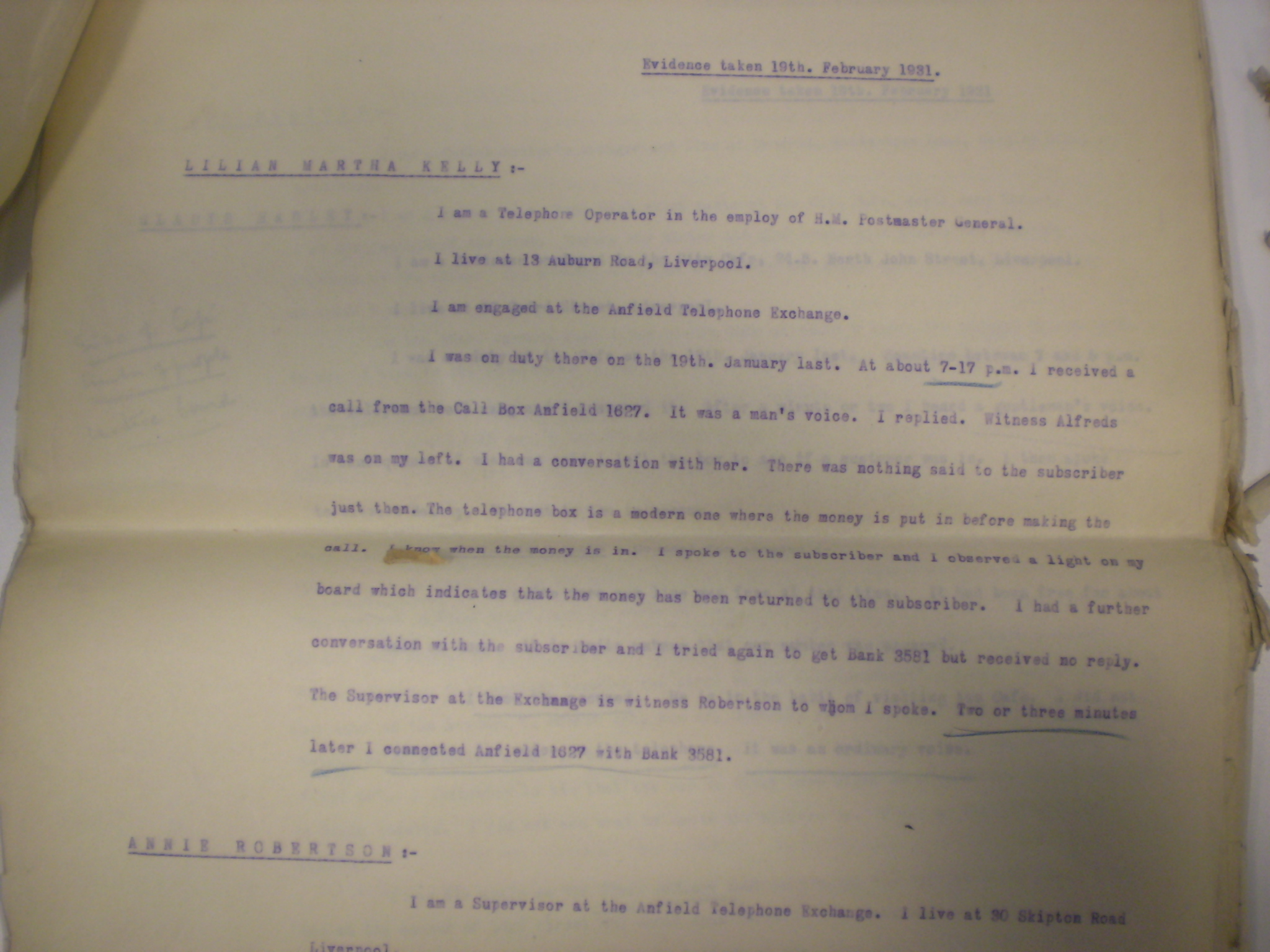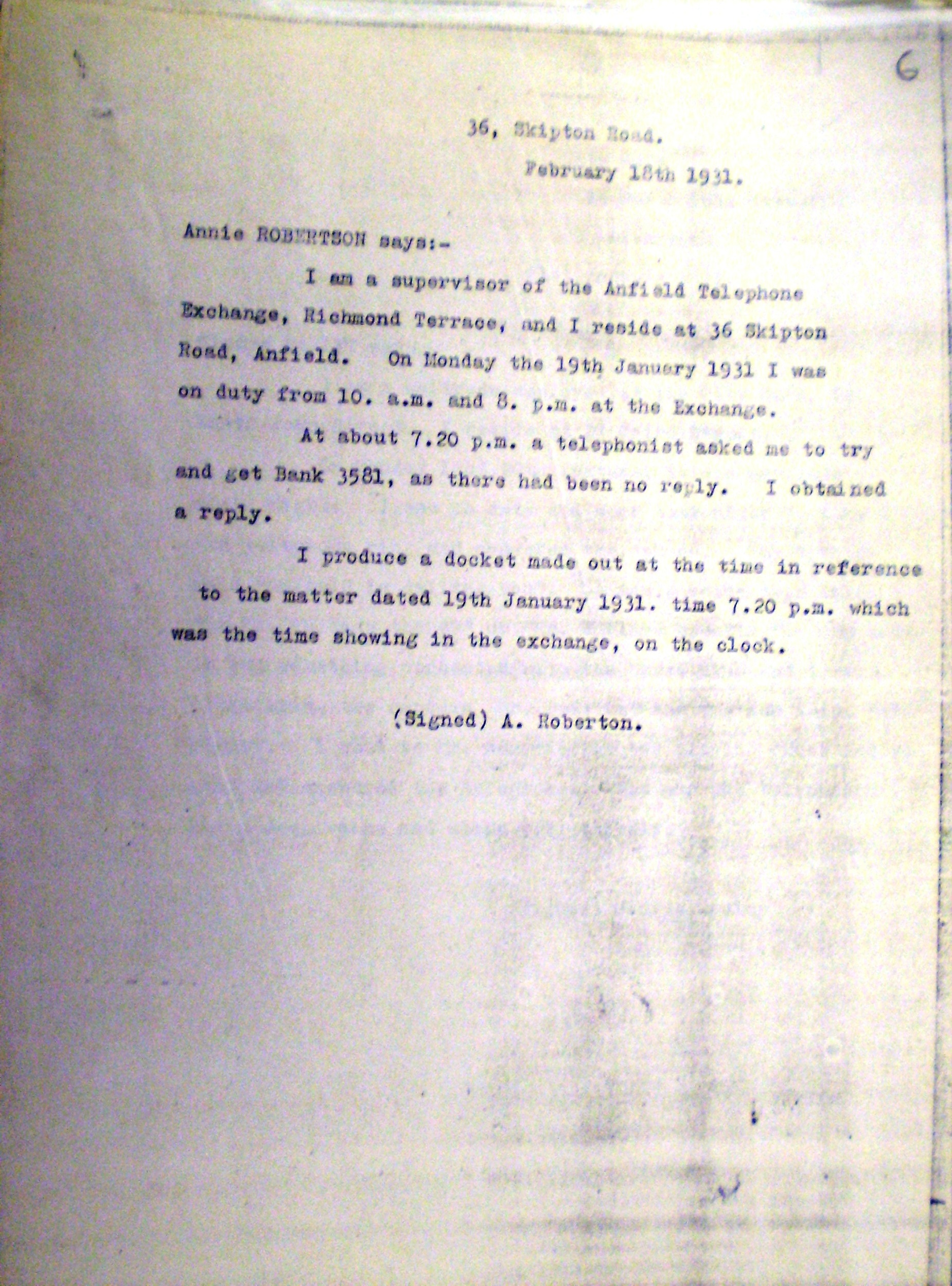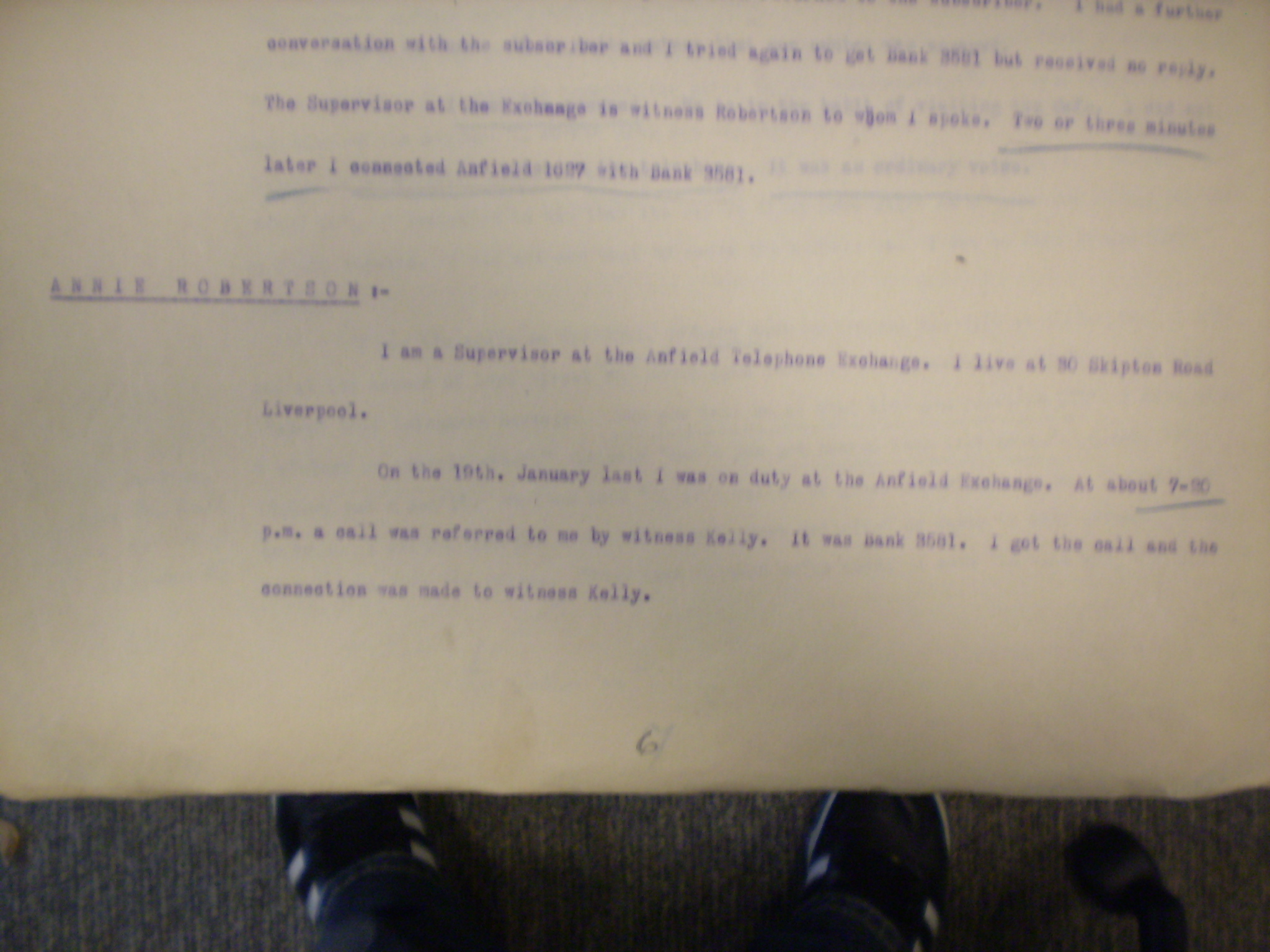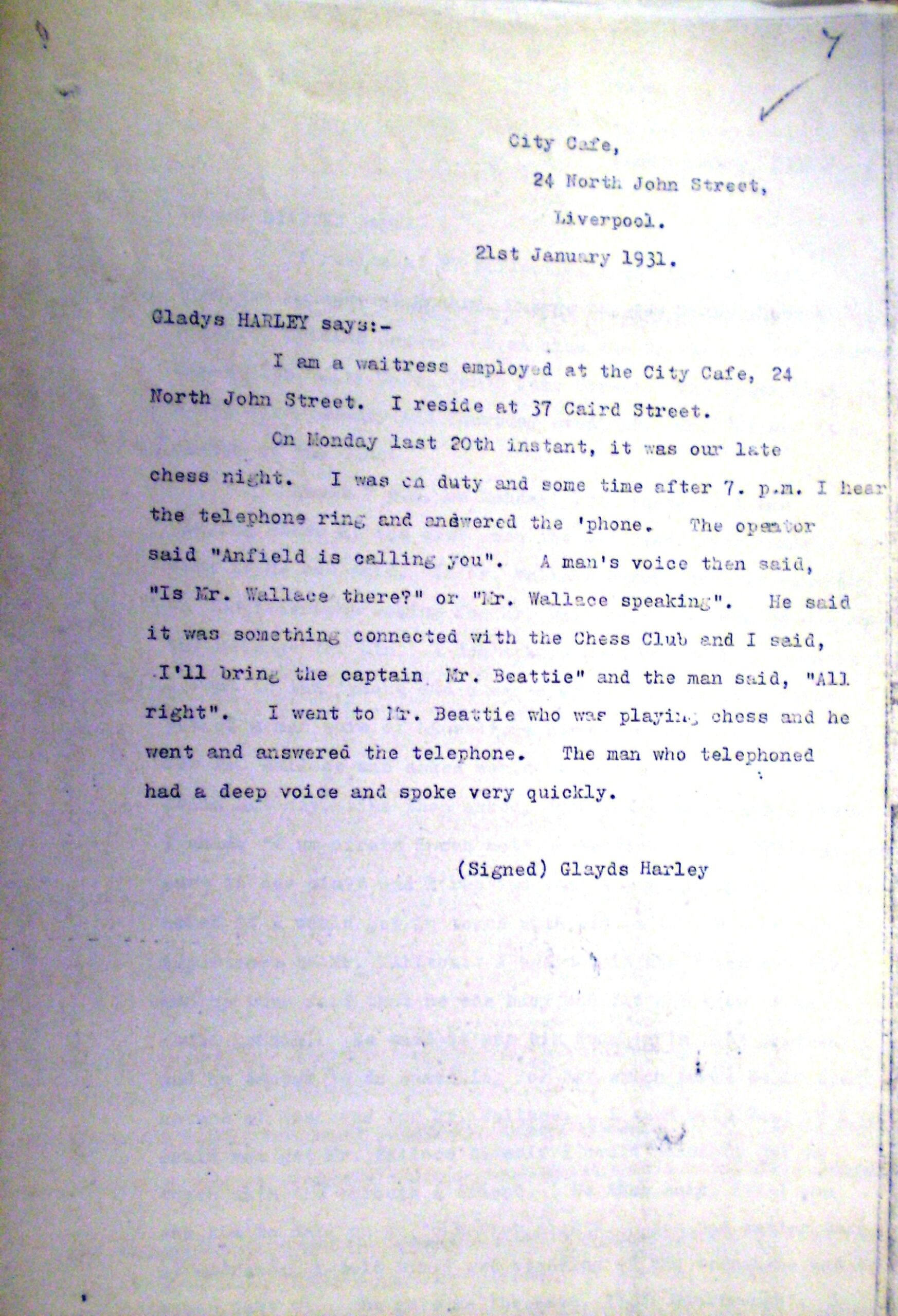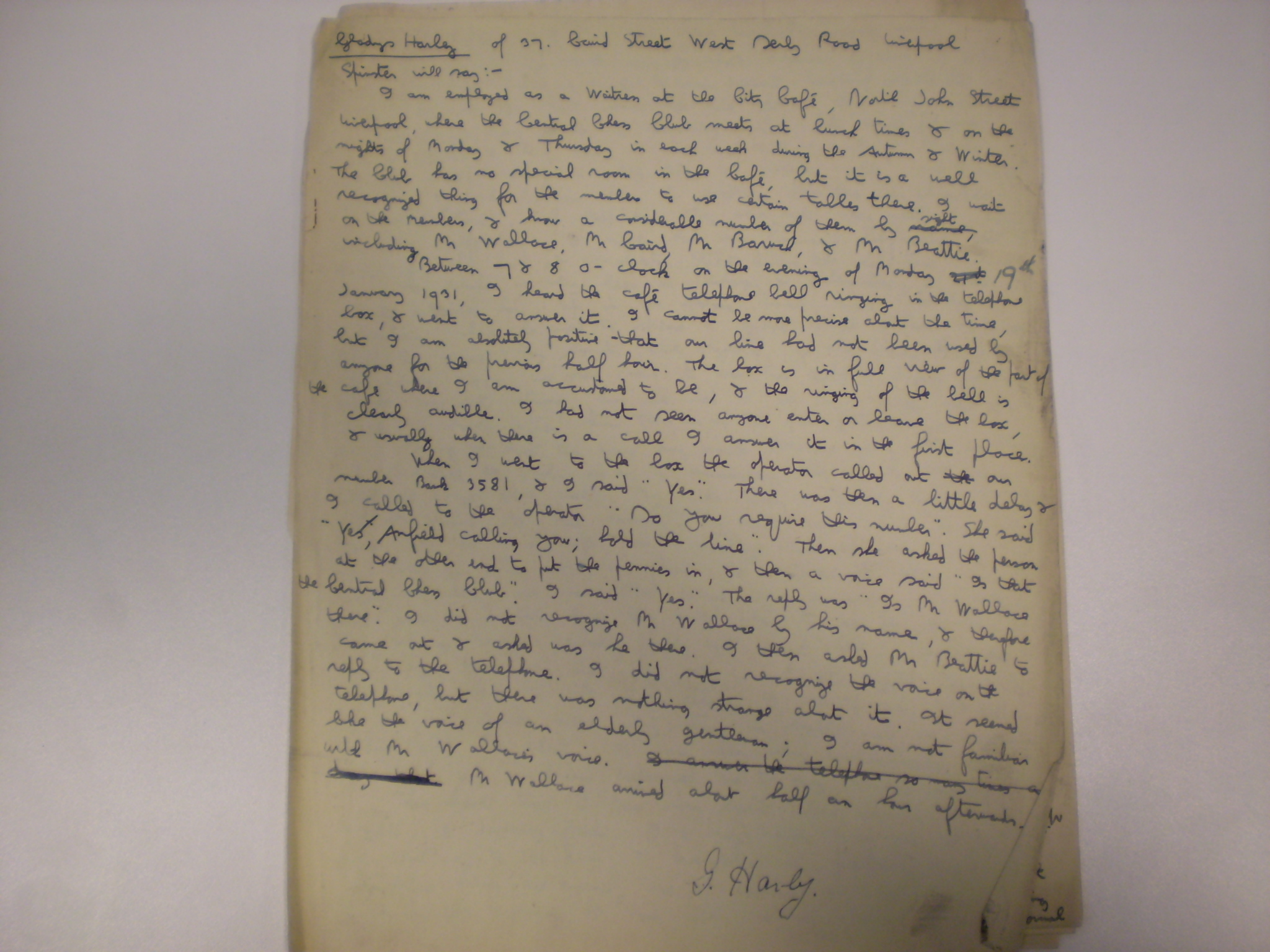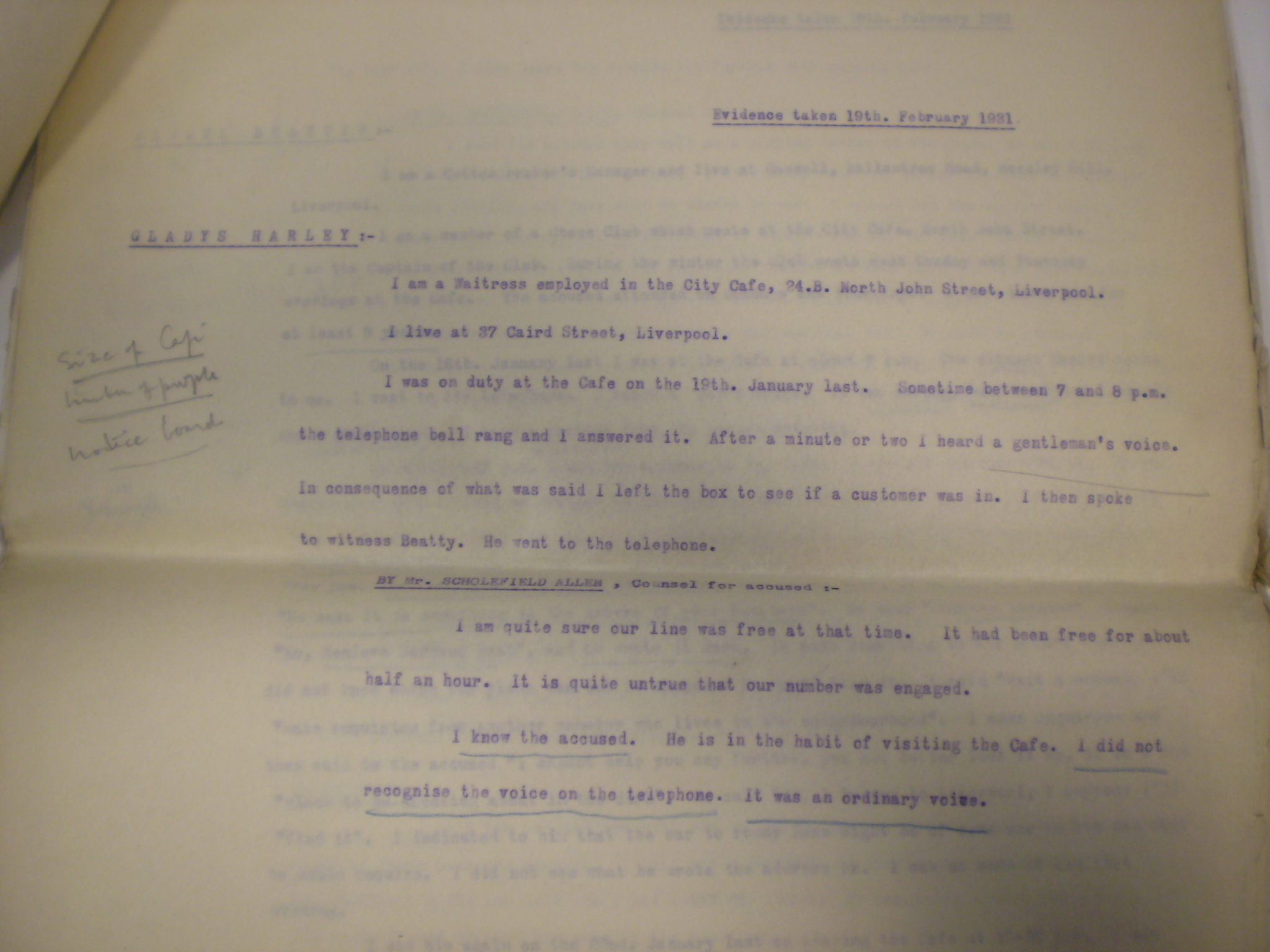Leslie Heaton (Electrician):
Statement #1:
C.I.D. Anfield.
Tuesday, February 17th 1931.
Leslie HEATON says:-
I am telephone Electrician in the employ of H.M. Post Office, Engineering Dept, Liverpool, and I reside at 12, Maldin Road, Liverpool.
Anfield 1627 on the telephone exchange is connected to a telephone kiosk which is fitted at the junction of Rochester Road and Breck Road, Anfield.
Bank 3581 on the telephone exchange is connected to a telephone and coin automatic box which is fitted to the premises of Messrs.Cottle and Cons, 24 B. North John St. [Cottle’s City Café, where the Central Chess Club plays on Mondays and Thursdays]
(Signed) L.Heaton.
Statement #2:
Evidence taken 19th. February 1931.
LESLIE HEATON:–
I am a Telephone Electrician in the employ of H.M. Postmaster General.
I live at 12 Malden Road, Liverpool.
There is a Public Telephone Box at the junction of Rochester Road and Breck Road, Anfield. It is shown on the plan W.H.W. 15. The Telephone Exchange Number is Anfield 1627.
On the Liverpool Bank Exchange there is a number, Bank 3581, attached to the telephone in the City Cafe 24.B. North John Street.
BY Mr. SHOLEFIELD ALLEN, Counsel for accused :-
I know the district well. I do not know if there is now a telephone call box in the Public Library, Breck Road, Anfield. I do not know of other telephone boxes in shops in Breck Road but there may be.
[Added Presumably by Munro: “Lit up at night”]
Trial:
Your name is Leslie Heaton? Yes.
Are you a telephone electrician in the employ of His Majesty’s Postmaster-General? Yes.
You live at 12 Malden Road, Liverpool? Yes.
Is there a telephone call box at the junction of Rochester Road and Breckfield Road, Anfield? Yes.
Have you got a plan of the district? No, I have not.
Take “WHW15” (Same handed). You see the telephone box in the top left hand corner; it is marked? Yes.
Is that the telephone number “Anfield 1627”? Yes.
On the Liverpool Bank Exchange is there a number attached to the City Cafe, North John Street, “Bank 3581”? Yes.
Is there a public telephone call box in the Public Library in Breck Road? Yes.
Do you know the number of it? I do not know if offhand. I think it is Anfield 692.
Do you know if there are any other call boxes in that district? Yes, there are several.
MR JUSTICE WRIGHT: Public ones? Yes, but they are not as public as this one inasmuch as the kiosk if fitted on a site of its own and the other call boxes are on enclosed premises.
MR WALSH: What kind of enclosed premises? The Library, and there is one at the Post Office known as Anfield Post Office. Then there is one at a sweet shop in the opposite side to the Post Office.
They are either in the Library or in shops? Yes.
CROSS-EXAMINED BY MR ROLAND OLIVER.
Is that call box lit up a night? No, I do not think it is.
There is no light in it? No.
When somebody gets into it to use it, I suppose the light comes up, does it not? No.
What? No, there is no light.
Do you know? Well, not definitely.
You are saying it definitely? If the light is there, it does not come up. When the person goes into the box, it will be alight.
I care not whether it goes up in the box or not. Is there a light in it which lights up? I am not sure.
MR JUSTICE WRIGHT: How can he do anything in darkness? What is the general position of those kiosks? Usually where there is no light; it is usually illuminated by lights which may be in the vicinity.
You mean a street light? Yes.
MR ROLAND OLIVER: What I am suggesting to you is that this box is a new type and has a light: it is there for anyone to go and look at it, a 60-candle power lamp burning at night. Is that right or wrong? I am not sure.
MR ROLAND OLIVER: You were saying just now it was not.
MR HEMMERDE: I will have that tested, my Lord.
MR JUSTICE WRIGHT: Yes, the witness does not happen to know.
Louisa Alfreds (First Operator):
Statement #1
General Post Office.
23rd January, 1931.
Louisa ALFREDS says:-
I am a telephone operator in the employ of the Postmaster, Liverpool, and engaged at Anfield Exchange, Richmond Terrace, Liverpool. I reside at 23, Saxon St., in this City.
On Monday the 19th January instant, I went on dury at 9 a.m. finished at 1 p.m. and resumed again at 4.30 p.m.
About 7.15 p.m. I received a call from 1627 Anfield, a call box at the corner of Rochester Road and Breck Road. The call was for Bank 3581. I answered and in a man’s voice the number 3581 was asked for. I plugged in, in the usual way and went on with my ordinary business. About two minutes later Miss Lilly Kelly, another operator, made a communication to me and I saw her endeavouring on the board to get Bank 3581 and I heard the same voice asking “Is that the City Cafe”. I then “came off” seeing that the call was put through.
The voice was quite an ordinary one and appeared to me to be that of a man used to using telephones. It was decidedly not gruff. I remember the voice particularly by reason of the way he pronounced “Cafe”. I remarked to Miss Kelly at the time “What a funny thing to say “City Café”
(Signed) L. Alfreds.
Statement #2:
Evidence taken 19th February 1931.
LOUISA ALFREDS:-
I am a Telephone Operator in the employ of H.M. Postmaster General.
I live at 23, Saxon Street, Liverpool.
I am engaged at the Anfield Telephone Exchange.
On the 19th. January last I was on duty at that Exchange. At 7-15 p.m. I received a call from the Call box 1627 Anfield. The call was for Bank 3581. It was a male voice, a quite ordinary voice. I plugged straight through to Bank 3581 and someone from that number came on the line. Witness Kelly, another operator, was beside me, and in about two minutes she made a communication to me. She was trying to get Bank 3581 for Anfield 1627. I did not hear the voice the second time.
Trial:
LOUISA ALFREDS, SWORN. EXAMINED BY MR WALSH.
Your name is Louisa Alfreds? Yes.
And you live at 23 Saxon Street, Liverpool? Yes.
Are you a telephone operator in the employ of His Majesty’s Postmaster General? You are engaged at the Anfield Telephone Exchange, are you not? Yes.
On the 19th of January, were you on duty about a quarter past seven? Yes.
Did you receive a call from Anfield 1627? Yes. Was the call for Bank 3581? Yes.
Could you tell what kind of voice it was? Just an ordinary voice.
Male or female? A male voice.
Did you put the call straight through to Bank 3581? Yes.
Did anyone from Bank 3581 come on the line? Yes.
A little later, did Miss Kelly make some communication to you? Yes.
Was she trying to get Bank 3581 or Anfield 1627? Yes.
And you did not hear her a second time. No.
MR ROLAND OLIVER: No question.
Lilian Martha Kelly (Second Operator):
Statement #1:
General Post Office.
23rd January, 1931.
Lilian Martha KELLY says:-
I am a single woman and reside at 13, Auburn Road in this City. I am a telephone operator in the employ of the Postmaster, Liverpool and engaged at Anfield telephone Exchange.
I went on duty at 12 noon on the 19th instant and finished at 8 p.m.
About 7.15 p.m. I received a call from 1627 Anfield a call box by the Cabbage Hall Picturedrome. A man’s voice said “Operator I pressed button ‘A’ and haven’t had my correspondent yet”. I asked him “What number did you ask for please” and he replied “Bank 3581”. I then spoke to Miss Alfreds who was the operator next to me, as a result of what Miss Alfreds told me I said to the man “Press button ‘B’ and regain your two pennies”. This he did. I asked him “Do you think there ought to be a reply from this number” and he said “Yes”. It’s a restaurant, there ought to be plenty of people there”. I again tried to get the number but failed. I informed the Supervisor and eventually I connected him with the number he had asked for.
I listened on the line for a moment with a view to ascertaining if he got the right people. I heard him say “Is that the City Cafe” and receive the reply “Yes”. I then went off the line.
The man spoke with an ordinary voice, certainly not a gruff voice and appeared to be a person accustomed to using the telephone. I particularly noticed when he used the sentence “City Cafe” the manner in which he stressed Café
By reason of the complaint of his not having had his conversation with the person he wanted when he first asked for his number, a record was made of his second call
Statement #2:
Evidence taken 19th. February 1931.
LILIAN MARTHA KELLY:-
I am a Telephone Operator in the employ of H.M. Postmaster General.
I live at 13 Auburn Road, Liverpool.
I am engaged at the Anfield Telephone Exchange.
I was on duty there on the 19th. January last. At about 7-17 p.m. [later that initially stated 7.15 PM] I received a call from the Call Box Anfield 1627. It was a man’s voice. I replied. Witness Alfreds was on my left. I had a conversation with her. There was nothing said to the subscriber just then. The telephone box is a modern one where the money is put in before making the call. I know when the money is in. I spoke to the subscriber and I observed a light on my board which indicates that the money has been returned to the subscriber. I had a further conversation with the subscriber and I tried again to get Bank 3581 but received no reply. The Supervisor at the Exchange is witness Robertson to whom I spoke. Two or three minutes later I connected Anfield 1627 with Bank 3581.
Trial:
Your name is Lilian Martha Kelly? Yes.
Do you live at 13 Auburn Road, Liverpool? Yes.
You are a telephone operator in the employ of His Majesty’s Postmaster General? And you are engaged at the Anfield Telephone Exchange? Yes.
Do you remember the night of the 19th of January about a quarter past seven? I do.
Did you receive a call from the call box Anfield 1687? Yes.
For Bank 3581? Yes.
What kind of a voice was it? Quite an ordinary voice.
Was it a man’s or a woman’s? A man’s voice.
What did he say? He said, “Operator, I have pressed button ‘A’ but have not had my correspondent yet”.
You had a conversation with Miss Alfreds, I understand? Yes.
This telephone is one where there is a button ‘A’ and button ‘B’? Yes.
Can you tell when the money has been put in? Yes.
Can you tell when one of the buttons has been pressed and the money has come out? Yes.
Did you observe a light or an indication which showed that the money had been returned? Yes.
Did you have any further conversation with the person in the box? Not just then.
Then you spoke to the supervisor, Miss Robertson? I tried to get the number again.
And you could not? No.
Then you spoke to the supervisor? Yes.
Did you afterwards connect Anfield 1627 with Bank 3581? Yes.
MR ROLAND OLIVER: No question.
Wilkes Interview (1980s):
‘The procedure in those days,’ she told me, ‘was that you lifted the receiver, asked the operator for the number you wanted, the operator connected you and said “Go ahead please”, and the caller then pressed button A, which caused the money to be taken and the connection to be made. ‘What happened when Qualtrough tried the first time was that he picked up the receiver and spoke to my friend Louisa Alfreds at the exchange and asked for Bank 3581. She made the connection, said “Go ahead please” and moved on to her next call. But a moment later the caller was back on to the exchange, and this time I took the call. He had obviously pressed the wrong button [button B instead of button A] and had cut himself off. The reason I remembered it was because he’d pressed the wrong button, and had paid his money but not received his correspondent. I said to Louisa Alfreds sitting next to me that this man had just been on before. Anyway I tried the Bank number twice. The first time the number was engaged, but the second time it rang. ‘When he spoke the voice sounded like a perfectly normal man’s voice. There was nothing peculiar about it that I can remember. It was a calm voice, very calm, certainly no sign of agitation or nervousness. I remember exactly what he said to me: “Operator, I have pressed button B but have not had my correspondent yet.” Later of course I heard Wallace speak at the trial, but I could not have sworn that it was the same man.’
– The Wallace Case by Roger Wilkes.
Annie Robertson (Supervisor):
Statement #1:
36, Skipton Road.
February 18th 1931.
Annie ROBERTSON says:-
I am a supervisor of the Anfield Telephone Exchange, Richmond Terrace, and I reside at 36 Skipton Road, Anfield. On Monday the 19th January 1931 I was on duty from 10. a.m. and 8. p.m. at the Exchange.
At about 7.20 p.m. a telephonist asked me to try and get Bank 3581, as there had been no reply. I obtained a reply.
I produce a docket made out at the time in reference to the matter dated 19th January 1931. time 7.20 p.m. which was the time showing in the exchange, on the clock. [Apparently not checked by police for accuracy].
(Signed) A. Robertson
Evidence taken on 19th February 1931.
ANNIE ROBERTSON:-
I am a Supervisor at the Anfield Telephone Exchange. I live at 36 Skipton Road Liverpool.
On the 19th. January last I was on duty at the Anfield Exchange. At about 7.20 p.m. a call was referred to me by witness Kelly. It was Bank 3581. I got the call and the connection was made to witness Kelly.
Annie Robertson:
Is your name Annie Robertson? Yes.
You live at 30 Skipton Road, Liverpool? Yes.
And you are supervisor at the Anfield Road Telephone Exchange? Yes.
On the 19th of January do you remember Miss Kelly referring a call to you from Box 1627 to Bank 3581? Yes.
Did you get the call through? Yes.
Do you remember the time? About 20 minutes past seven.
Did you make a note of the time? Yes.
Have you got the note there? Yes.
What time is it? 20 minutes past seven.
MR JUSTICE WRIGHT: May I see the note? Yes, my Lord (Same handed to his lordship). It is the top one.
Mr Walsh: Why did you make a note? It is the usual thing to do when an enquiry is made like that.
What do you mean? The voice asked me to try it.
MR JUSTICE WRIGHT: I see on the margin you have a lot of letters; one is “N.R.”? That is “No Reply”.
And you have put a pencil mark? Yes.
The trouble was there was no reply? Yes.
And you made a note to pass it on I suppose to someone else? We keep it for reference.
MR JUSTICE WRIGHT: Was that 7.20? MR WALSH: Yes. (To the witness): And you did later get the call through? Yes.
And you put the caller through to the witness Kelly? Yes, the caller was put through at 7.20.
CROSS EXAMINED BY MR ROLAND OLIVER.
If The times are correct the person, whoever it was, trying to get that number started at 7.15 and went on to 7.20? Yes. At 7.15, the call was through.
MR JUSTICE WRIGHT: Where does it appear it was through at 7.15?
MR ROLAND OLIVER: The witness Alfreds said it was 7.15, the call, and afterwards this witness says it got through at 7.20.
MR HEMMERDE: That should be made an exhibit, my Lord.
MR JUSTICE WRIGHT: yes, it should be.
MR HEMMERDE: It will be Exhibit 51.
Gladys Harley
Statement #1:
City Cafe,
24 North John Street,
Liverpool.
21st January 1931.
Gladys HARLEY says:-
I am a waitress employed at the City Cafe, 24 North John Street. I reside at 37 Caird Street.
On Monday last 20th instant, it was our late chess night. I was on duty and some time after 7. p.m. I hear the telephone ring and answered the ‘phone. The operator said “Anfield is calling you”. A man’s voice then said, “Is Mr. Wallace there?” or “Mr. Wallace speaking”. He said said it was something connected with the Chess Club and I said, I’ll bring the captain Mr. Beattie” and the man said, “All right”. I went to Mr. Beattie who was playing chess and he went and answered the telephone. The man who telephoned had a deep voice and spoke very quickly.
(Signed) Glayds (sic) Harley
Statement #2:
Gladys Harley of 37 Caird Street West Derby Road Liverpool Spinster will say:-
I am employed as a Waitress at the City Café, North John Street Liverpool where the Central Chess Club meets at lunch times & on the nights of Monday & Thursday in each week during the Autumn & Winter. The Club has no special room in the Café, but it is a well recognized thing for the members to use certain tabled there. I wait on the members, & know a considerable number of them by sight, including Mr Wallace, Mr Caird Mr Banwell, & Mr Beattie.
Between 7 & 8 o-clock on the evening of Monday 19th January 1931, I heard the café telephone bell ringing in the telephone box, & went to answer it. I cannot be more precise about the time, but I am absolutely positive that our line had not been used by anyone for the previous half hour. The box is in full view of the part of the café where I am accustomed to be, & the ringing of the bell is clearly audible. I had not seen anyone enter or leave the box, & usually when there is a call I answer it in the first place.
When I went to the box the operator called out our number Bank 3581, & I said “Yes.” There was then a little delay & I called to the operator “Do you require this number”. She said “Yes, Anfield calling you; hold the line”. Then she asked the person at the other end to put the pennies in, & then a voice said “Is that the Central Chess Club“. I said “Yes.” The reply was “Is Mr Wallace there”. I did not recognize Mr Wallace by his name, & therefore came out & asked was he there. I then asked Mr Beattie to __ to the telephone. I did not recognize the voice on the telephone, but there was nothing strange about it. It seemed like the voice of an elderly gentleman; I am not familiar with Mr Wallace’s voice. I answer the telephone so many times a day that (?) Mr Wallace arrived about half an hour afterwards.
G. Harly.
Statement #3:
Evidence taken 19th. February 1931
GLADYS HARLEY :-
I am a Waitress employed in the City Cafe, 24.B. North John Street, Liverpool.
I live at 37 Caird Street, Liverpool.
I was on duty at the Cafe on the 19th. January Last. Sometime between 7 and 8 p.m. the telephone bell rang and I answered it. After a minute or two I heard a gentleman’s voice. In consequence of what was said I left the box to see if a customer was in. I then spoke to witness Beatty. He went to the telephone.
BY Mr. Scholefield Allen, Counsel for accused :-
I am quite sure our line was free at that time. It had been free for about half an hour. It is quite untrue that our number was engaged.
I know the accused. He is in the habit of visiting the Cafe. I did not recognise the voice on the telephone. It was an ordinary voice.
[In Margin: “Size of Café
Number of people
notice board]
Trial:
Is your name Gladys Harley? Yes.
You live at 37 Caird Street, Liverpool? Yes.
You are a waitress at the City Cafe, 24 North John Street? Yes.
Were you on duty at the Cafe on the 19th January last? Yes.
Did the telephone bell ring – between what time? Seven and eight.
Did you answer it? Yes.
Who answered the telephone at the other end? I could not say.
What kind of voice was it? Just an ordinary voice.
A man’s or a woman’s? A man’s.
In consequence of what he said, you went to see if a certain customer was in? Yes.
Then you spoke to Mr Beattie and he went to the telephone? Yes.
CROSS EXAMINED BY MR ROLAND OLIVER.
How big is this Cafe, is it a big place? Yes.
How many rooms are there? Four.
All on the ground floor? And there are a lot of tables? Yes.
Do you have many customers? Yes.
Have you any idea how many people use your restaurant every day. Would it be a hundred? Yes, it would be about that.
A hundred? Yes.
I do not want to ask you a lot about the Chess Club because I will get it from somebody else, but there is a Chess Club which uses some of the tables in your room on certain days? Yes.
Have they got a notice posted up near the doorway of your restaurant? No.
You may not have noticed them, but there are some notices up, are not there? Yes, on the side.
Whereabouts are they? By the telephone box.
I beg your pardon, I said the door; I meant the telephone box. It is not far from the door? No.
Have you ever looked at the notices? I have at times.
Do they give the names of people and the dates when they are coming to play the matches? Yes.
So that if you looked at the list you could see if you know a man’s name on what day he was expected to come for a match? Yes.
MR JUSTICE WRIGHT: That is inside the Cafe and by the telephone box? Yes.
What sort of thing, a square frame in which you can put in and take out a name or names written on a slip or what? Names written on a board.
MR ROLAND OLIVER: If I were to show you a photograph of the board, you would probably know it by sight? Yes.
Is that a photograph of the board? (Same handed). Yes.
You recognise that? Yes.
That is the notice board, is it? Yes.
MR ROLAND OLIVER: Your Lordship would like to see it? MR JUSTICE WRIGHT: Yes. That will be Exhibit no 52. Were the names here? MR ROLAND OLIVER: I was going to put in a photograph of an enlargement of one of those. May I respectfully suggest, I think I could do this better with a witness who is coming who will remember it. MR JUSTICE WRIGHT: Very well, you have done enough. You can leave it for the moment. MR ROLAND OLIVER: If your Lordship pleases.

